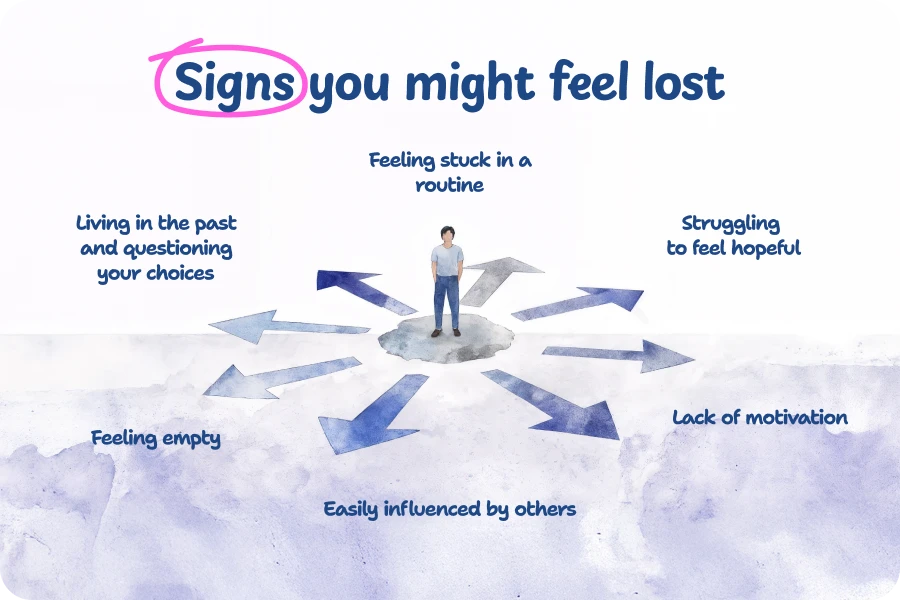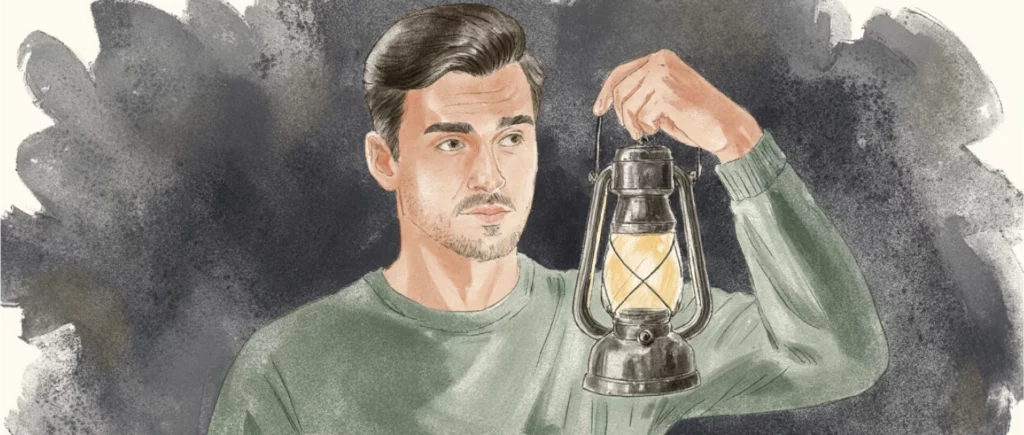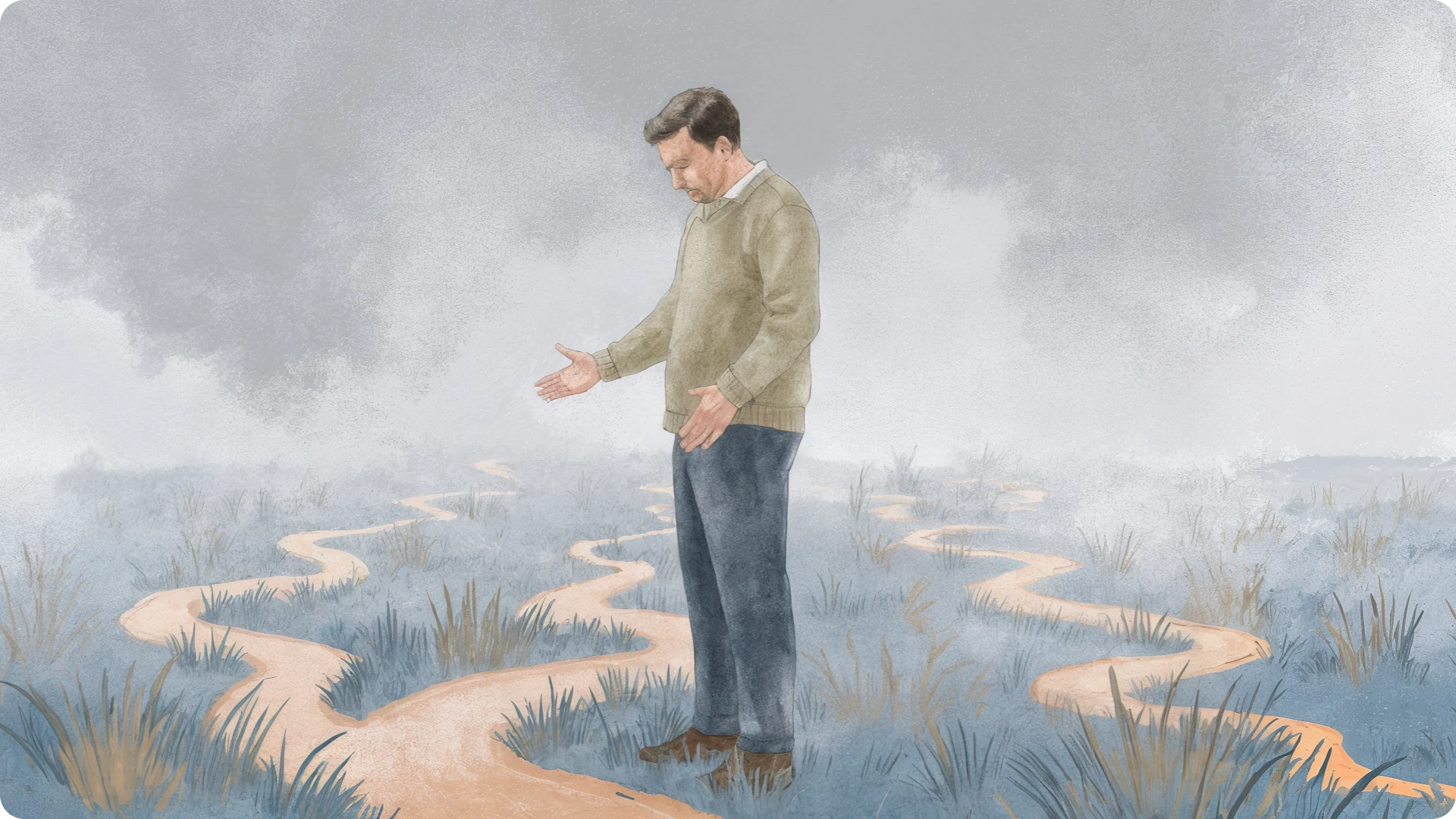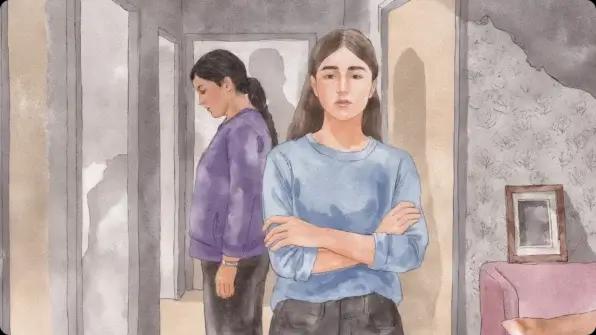You used to feel driven and had goals. But now all you know is that things need to change, yet you have no idea where to start or what to do. Or maybe one day, you just woke up and realized you have been on autopilot for years.
Why does this feeling of being lost arise? How to understand what path you should follow? Let’s find out why you feel this way and how to take control of your life.
You can begin by learning more about your personality and how it influences your choices, habits, and motivations.
What Does It Mean to Feel Lost?
Feeling lost in life can bring up all sorts of mixed emotions like sadness, worry, frustration, and uncertainty. You can feel you’re stuck between what you know isn’t working and what comes next, or what you sense you should be doing.
In fact, many people are feeling lost and may sometimes think, “I don’t know what to do with my life“. According to recent research by the Harvard Graduate School of Education, three in five young people feel their lives lack meaning and purpose [1]. At the same time, less than 50% of U.S. adults reported “thriving” on Gallup’s Life Evaluation Index in 2025, which highlights the uncertainty many feel about the direction of their life path [2].

So, when can we say we are lost in life? Here are some common signs you might recognize:
- Living in the past and questioning your choices. You keep asking yourself “what if” about a past relationship, replaying conversations and memories in your head, or wondering whether you made the right decision.
- Feeling stuck in a routine. Every day feels the same: wake up, work, eat, sleep, repeat. You may feel bored or restless. You want a change but need to know where to start.
- Lack of motivation. You feel uninspired, thinking, “Why am I so unmotivated?” and need more energy to do all the things you used to enjoy. Maybe you have a big work project due, but you find yourself constantly procrastinating, lacking the drive to start.
- Feeling empty. You might have a pretty good life and supportive loved ones, but wonder, “Why do I feel empty?“. You can’t quite say what’s wrong, but you’re just lost and unhappy. It can feel like you don’t have much of a sense of purpose or meaning.
- Not feeling excited about the future. Do you remember the last time you dreamed about the future? Traveling the world, getting your dream job, starting a business, or writing a book? Now, the thought of making such plans feels gray and pointless.
- Easily influenced by others. You frequently change your mind based on the opinions or suggestions of others. It can be hard to know or trust your own intuition.
Take the Breeze well-being test to get a complete picture of your emotional and mental wellness.
Why Do I Feel Lost in Life? 9 Common Causes
It’s important to remember that you don’t need a significant life change to feel lost. However, let’s have a look at the most common causes:
1. Lack of self-awareness
You might find yourself asking existential questions like, “What do I really want?” or “Why am I so unhappy?” The main reason for that can be the disconnection with your emotions. That’s why it’s so hard to be certain about things.
Start with an emotional intelligence test to better understand how you recognize, process, and respond to your feelings. Improving your emotional awareness can help you reconnect with yourself and find the path to your personal growth.
2. Stress, burnout, or overwhelm
Feeling lost in life can be tied to prolonged stress or burnout. When your mind and body are constantly under pressure from an unsatisfying job, caring for family, or managing finances, it becomes difficult to focus on your goals or passions. Overwhelm can create a sense of being stuck, as if life is moving forward without you.
Burnout may also be a reason for mood fluctuations, when you feel fine one minute and overwhelmed or tearful the next, thinking, “Why do I feel sad for no reason?”.
3. Life changes or crisis
At some point, everyone experiences life transitions when they have to make important decisions or deal with challenging circumstances. Life events like choosing a career path, deciding where to live, or becoming a parent can feel overwhelming. Moreover, you may feel like choosing one option means losing out on another one. This can be very hard, and the fear of missing out can also cause you to feel lost, according to research on FoMO [3].
For example, someone starting their first job might already wonder if they picked the right career. On one hand, the job feels safe and steady, but on the other, they might dream about doing something more meaningful. They can feel stuck between the fear of missing out on a more exciting job and the fear of giving up security and financial stability too soon.
4. Suppressed emotions
Sometimes suppressing emotions causes people to feel lost within themselves. Eventually, when you shut down your emotions, you may feel lost and disconnected from the present moment. For example, pretending everything is okay at work or in a relationship, while hiding frustration, can make you feel unsure of what you really want.
In some cases, suppressing emotions can be related to childhood trauma or other forms of adversity. If you had emotionally immature parents or an abusive dad and felt unsafe as a kid, you might have developed coping mechanisms to avoid those feelings. Eventually, pushing down emotions, even the good ones, can become a habit.
5. Lack of purpose
It may be that feeling lost is partly due to a lack of goals. You feel no purpose or direction in life. Typically, goals are a source of satisfaction. They can give us motivation and persistence, according to a study on the neuroscience of goals [4].
For example, a young person taking a gap year or a break between school and work might be excited at first. They may have the opportunity to travel, try new hobbies, or just have free time. But without any clear goals, it can start to feel empty. They might spend a lot of time scrolling on social media, wondering if everyone else is doing better, or feel unsure about what to do next. Even fun activities can feel boring if there’s no real purpose, which can make them feel lost and frustrated.
It’s okay if you’re not sure what you want. However, figuring out your true desires or dreams can be difficult if you struggle to understand yourself. The Breeze app offers a variety of self-discovery tests that can give you insights into your personality, career, goals, relationships, and response patterns.

5. Comparison to others
Constantly measuring yourself against others can influence your self-esteem and make you feel worthless and unable to take action. As a result, it makes you feel like a failure and creates a sense of being lost. To complicate matters, according to research, the constant stream of highlights on social media, where everyone’s life looks perfect, can be a significant source of stress [5].
7. Isolation and lack of support
Loneliness and social isolation are widespread in the U.S. and are linked to higher risks of depression, anxiety, heart disease, and even early death. Nearly 1 in 3 adults report feeling lonely [6].
In fact, it’s easy to lose your sense of direction when you feel lost and alone, isolated from others, or like you don’t belong. For instance, you might feel lost if you’ve recently ended a long-term friendship or relationship. The same applies to the death of a close family member. You may lack familiar routines, stability, and the support you used to rely on in your daily life.
8. Societal pressures
Parents or society may set a schedule for reaching life’s main objectives, such as graduating, getting a stable job, getting married, and purchasing a home. However, these goals, plans, and aspirations may be imposed from outside and don’t align with your personal values. When you think “I need to do this to make everyone happy” and start shaping your life around other people’s expectations, you risk losing your sense of self.
As a result, feelings of not being good enough can come up when reality doesn’t match these expectations. You may start to doubt your decisions and wonder, “Why am I feeling lost?”.
Do you experience parental or societal pressure?
9. Mental health conditions
Feeling lost can sometimes overlap with deeper mental health conditions. Emotional numbness, hopelessness, or a sense of detachment from reality may signal more than just temporary confusion [7]. These symptoms can point to conditions such as depression or anxiety disorders.
Expert Insight
Perpetually feeling lost can be a sign of underlying depression, anxiety, or PTSD. In this case, feeling lost is a “symptom” of a greater concern. It is not inherently problematic, but it can reinforce other struggles with emotion regulation, distress tolerance, and relationships.
Nicole Arzt
Mental health professional
The Hidden Meaning of Feeling Lost
Feeling lost may seem like only a negative human experience, but it can give you valuable insights about your life and help you to become the best version of yourself.
Here are the hidden advantages of feeling lost:
1. Self-reflection
When you feel lost, you may pause and evaluate your life, asking yourself, “What truly matters to me?” or “Am I living according to my core values?” These self-reflection questions can be the first step towards better intrapersonal skills.
2. Opportunity for change
If you wonder how to change your life, you may try things you’ve been avoiding or make different choices. For example, if you’re unhappy in your corporate job, you might finally try a creative hobby, start freelancing, or take courses to learn new skills. There can be options you wouldn’t have considered if you didn’t feel lost.
3. Resetting priorities
You may discover that some commitments, habits, or relationships no longer bring you joy. To clarify, you may decide you don’t need to keep up with toxic friendships and instead start making new supportive friends who share your values. You may even wonder how to break up with your romantic partner if this relationship doesn’t feel right anymore.
Expert Insight
The permission to ‘lose yourself’ may seem paradoxical. But by letting go of control or expectations, you may find more of the essence of who you are. When you release the pressure of “how to be” or “what to do,” you may be able to find a greater sense of clarity within yourself.
Nicole Arzt
Mental health professional
What To Do When You Feel Lost? 5 Key Steps
Feeling lost can be a sign that something needs to change. It can be a chance to explore new things and find your purpose again. To make it happen, you may try the following steps:
1. Reflect on your life experience through journaling
If you lack self-awareness or suppress emotions, it’s easy to feel disconnected from yourself and unsure about what you really want. The first step in dealing with these complex feelings of “feeling lost” is to learn how to feel your feelings.
Take time to ground yourself and sit with your thoughts and emotions, perhaps through mindfulness activities or journaling. Studies on expressive writing have shown that journaling can improve sleep, boost the immune system, and increase self-confidence [8].
The good news is you can start with small steps. With Breeze guided journaling, you can structure your thoughts and concerns, track your emotional progress, and gain insights into your behavioral patterns.

2. Define your strengths and goals
Here are some questions to get you started, if you lack purpose in life:
- What activities bring you joy? What makes your day feel good?
- What skills have helped you overcome challenges?
- What are you naturally good at at work? Organizing projects? Teamwork?
- When are you most focused and productive?
Answering these questions lets you gather insights if you wonder, “What career is right for me?” and may help you be more productive in your daily life and make choices that align with who you really are.
Breeze personalized routines can help you set a goal and track your progress. It offers you healthy tips daily, so you won’t even feel like you’re putting in extra effort while being lost. After a while, you may see how much your mood has improved and that you feel much better, lighter, and happier.

3. Prioritize your values
Are you constantly comparing yourself to others or feeling the burden of social expectations? When this happens, the possible reason is that you’re trying to measure yourself against standards that aren’t really yours. That’s why it’s so important to define your values and what matters most to you:
- Make a list of values that resonate with you. These can be qualities like balance, confidence, kindness, or personal growth. You can also think about areas of life that feel especially meaningful, such as relationships, career, health, sports, or travel.
- Ask yourself: Which values feel non-negotiable? Which ones give my life the most meaning? Which are nice to have but not central to who I am? Put your top values at the core of your list, then add the ones that support them, and finally, the ones that are meaningful but less essential.
Prioritizing your values can help you make better choices. You’ll have a clear guide that keeps you focused on what’s important to you rather than chasing what other people seem to value. This can make it simpler to avoid comparison, cope with the pressure of expectations, and discover a deeper sense of purpose.

4. Treat yourself with self-compassion
If you feel stuck or overwhelmed with responsibilities, take a step back. Make time for real rest, whatever that means for you. Listen to your favorite music, watch a movie you’ve been postponing for years, eat your favorite food, or simply take a walk outside. Anything that helps you unwind is perfect.
Maybe you’d even suggest taking a break from work or study to avoid burnout. Why not give yourself that same kindness you’d offer to a friend, partner, or family member? Self-compassion allows you to be gentle with yourself and offer grace when life feels hard.
5. Talk to a professional
If you’re thinking about a big change, like a new career, there are people who can help guide and support you. Career coaches are guides who can show you different paths, answer your questions, and give you practical advice.
If you are unsure which direction to turn and realize you may need additional support, reach out to a licensed mental health professional to learn tools for managing stress, anxiety, or uncertainty, and work through unresolved emotional baggage that may be affecting your well-being.
Sources
- Harvard Graduate School of Education. On Edge: Understanding and Preventing Young Adults’ Mental Health Challenges. October 2023
- Dan Witters. Americans’ Life Ratings Slump to Five-Year Low. April 2025
- Jainish Patel, Prittesh Patel. Consequences of Repression of Emotion: Physical Health, Mental Health and General Well Being. February 2019
- Berkman ET. The Neuroscience of Goals and Behavior Change. March 2018
- Warrender D, Milne R. How use of social media and social comparison affect mental health. February 2020.
- U.S. Centers for disease control and prevention. Health Effects of Social Isolation and Loneliness. May 2024
- Howard E. LeWine, MD, Chief Medical Editor, Harvard Health Publishing. Are you missing these signs of anxiety or depression? September 2024.
- Bridget Murray. Writing to heal. June 2002
Disclaimer
This article is for general informative and self-discovery purposes only. It should not replace expert guidance from professionals.
Any action you take in response to the information in this article, whether directly or indirectly, is solely your responsibility and is done at your own risk. Breeze content team and its mental health experts disclaim any liability, loss, or risk, personal, professional, or otherwise, which may result from the use and/or application of any content.
Always consult your doctor or other certified health practitioner with any medical questions or concerns
Breeze articles exclusively cite trusted sources, such as academic research institutions and medical associations, including research and studies from PubMed, ResearchGate, or similar databases. Examine our subject-matter editors and editorial process to see how we verify facts and maintain the accuracy, reliability, and trustworthiness of our material.
Was this article helpful?





